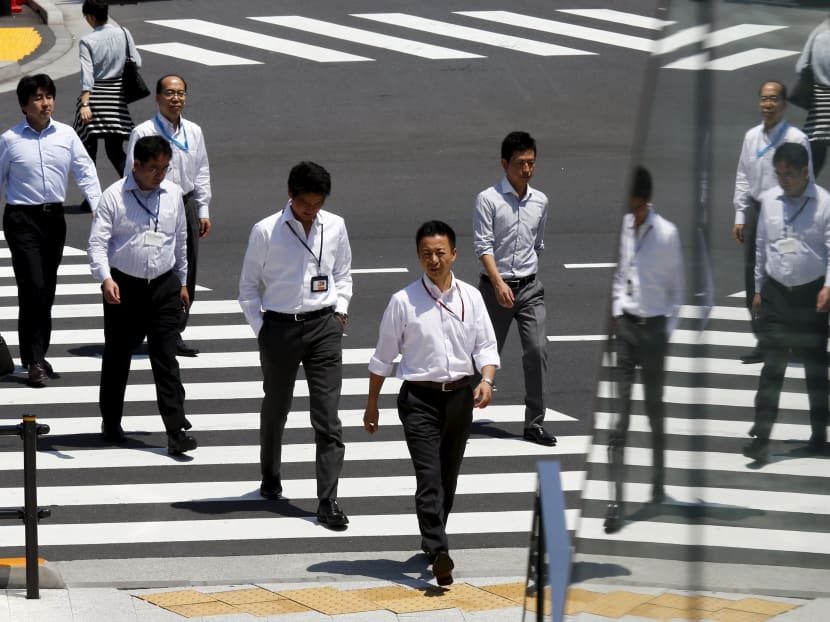Japan firm considers 3-day weekends as nation rethinks culture of long work hours
TOKYO — Japan is stepping up its drive to pressure companies into abandoning a culture of long working hours.

Office workers are reflected in a glass railing as they cross a street during lunch hour in Tokyo June 1, 2015. Photo: Reuters
TOKYO — Japan is stepping up its drive to pressure companies into abandoning a culture of long working hours.
Prosecutors this week began reviewing whether Mitsubishi Electric Corp forces its employees to work excessive hours — a move that follows an investigation of Dentsu Inc, Japan’s biggest advertisement agency, where a female worker who put in more than 100 hours of overtime in a month committed suicide.
Mitsubishi Electric said in a statement that it will “deal sincerely with the matter” and will monitor work hours closely and educate managers and employees on the issue. The labour ministry will continue to take a firm stance against long work hours, according to a spokesman who asked not to be named due to ministry policy.
The government is also seeking a shift in the corporate mindset to encourage flexibility and boost a labour force being depleted as the population shrinks. Mr Yoshihide Suga, the top government spokesman, said Wednesday (Jan 11) that Japan needs to “end of the norm of long working hours so people can balance their lives with things like raising a child or taking care of the elderly.”
While Mitsubishi Electric and Dentsu have been hammered by the public in recent months, the issue of overwork remains widespread, according to Dr Hiroyuki Fujimura, a professor at Hosei Business School of Innovation Management. While long working hours were previously praised as a trait of a hard-working, disciplined worker, perceptions are changing, he said.
“While those in their 40s and 50s may still hold such views, those in the younger generation no longer see long work hours as a good thing,” Dr Fujimura said.
BOOSTING PRODUCTIVITY
The government and business groups will launch a “Premium Friday” campaign in February to encourage companies to let workers leave early on the last Friday of every month to go out and have fun. Some companies are taking their own steps to reduce hours and create a more flexible working environment.
Suntory Holdings is expanding its work-from-home programme and Japan Post Insurance Co turns off the lights in its headquarters at 7.30pm, the Yomiuri newspaper reported. Yahoo Japan Corp allows employees to work remotely five times a month and is considering the introduction of a three-day weekend by 2020, according to company spokeswoman Megumi Yagita.
“We don’t see the three-day weekend system as the end goal but an option,” Ms Yagita said. “By giving employees more freedom on how to work, we’re hoping that employees choose a style that lets them perform at their best, so that we boost productivity.”
Mr Martin Schulz, senior economist at Fujitsu Research Institute in Tokyo, sees companies being driven by practical needs.
“Companies went through cost-cutting, and what’s now left at the core is the remaining workers who are overloaded,” Mr Schulz said. “Companies are now seeking ways to boost productivity, the best results in the best amount of time.” BLOOMBERG






